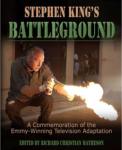Stephen King’s Battleground: A Commemoration of the Emmy-Winning Television Adaptation
Richard Christian Matheson, editor
Gauntlet Press
Hardcover, 288 pages, $75.00
Review by Sheila M. Merritt
Silence can indeed be golden. This year’s Academy Awards darling was the mostly mute movie, The Artist. In 2006, an hour-long television adaptation of a Stephen King yarn also garnered gilded trophies. “Battleground,” which was part of TNT’s series Nightmares & Dreamscapes: From the Stories of Stephen King, is another example of a dialogue-deficient award winner. This arresting TV oddity is examined at length in Stephen King’s Battleground: A Commemoration of the Emmy-Winning Television Adaptation. There is a lot to be said about “Battleground’s” development from a King short story into its wordless small screen treatment. Editor Richard Christian Matheson, who also wrote the teleplay, wisely includes the original work in this book; allowing for a fascinating compare/contrast. The volume is primarily a compilation of interviews and essays concerning those who participated in the televised production. Their enthusiastic and thoughtful remembrances of the creative process make this tome a joy to read.
Despite some trepidation about enticing an audience with a narrative devoid of speech, the imaginative demands inherent in the project actually fueled the artistic process. Musical arrangement, for example, would by necessity play a more prominent role: It would greatly assist in conveying mood; characterization; plot. Brilliantly rising to the occasion (and subsequently winning an Emmy for his score) composer Jeff Beal carefully considered an approach to the theme: “One of the tricky, dramatic challenges of the films is getting the music, in the expositional scenes, right. In this case, we are about twenty minutes into the story before the soldiers start their attack. I thought of this music as a form of dramatic foreplay, i.e. ‘something’s coming, pay attention,’ but also not giving away too much, too soon in the music.”
The visual effects, which also received an Emmy, were an extremely important factor in engrossing the viewers. But with admirable humility, visual effects supervisor Sam Nicholson gives a shout out to the man who acted in reaction to effects he couldn’t see. He acknowledges William Hurt’s amazing performance: “He gave ‘Battleground’ emotional guidance that kept the audience involved and kept the show from turning into just another effects piece.”
Giving credit and inspiration where it is due, is prevalent in the book. And references, as well as homages, abound. The King tale bears resemblances to two well-known television horror stories. Most apparent is a Twilight Zone episode entitled “The Invaders.” The classic character study features Agnes Moorehead, left to her own devices, battling a Lilliputian assault. Again told virtually without dialogue, this is the work of Richard Christian Matheson’s legendary father: Richard Matheson. Dad also devised the tale “Amelia” which is based on his short story “Prey.” In “Amelia,” the title character is repeatedly attacked by a Zuni fetish doll. In “Battleground” the doll appears in the background as one of the protagonist’s keepsakes. This is a wink-wink moment for those in the know, but the senior Matheson’s major contribution to “Battleground” is “The Invaders.” Says producer Jeffrey Hayes: “Obviously there is an homage to it, both from Richard Christian Matheson’s side, given that he’s his father’s son, and probably, although I never discussed this with Stephen King or anybody, from Stephen King, himself, when he wrote the short story. The short story was our template and our guide. I would say it’s likely that it was an homage on both their parts.”
Richard Christian Matheson, in his introduction, distills the plot of “Battleground” as “Mouse Hunt gene-spliced with Paths of Glory into a one-hour war movie that fits in your hand.” This is a brilliant summation that sets the course of what to anticipate in Stephen King’s Battleground: A Commemoration of the Emmy-Winning Television Adaptation. In addition to essays/interviews there are also storyboards, plus the beginning pages of Jeff Beal’s score. And, according to the uncorrected proof’s blurb: “The hardcover edition of Stephen King’s Battleground contains 16 pages of color photos from the TNT archives.” Since these photos weren’t offered in the review copy of the omnibus, no comment can be made about them here. Regarding the book in general: Stephen King fans will likely be rendered speechless with delight.










Sheila,
Great review of a book I look forward to reading when it comes out. I loved the short story when it was published in Night Shift, and I really loved the TV adaptation of it with William Hurt. Everything was perfect about the show. Needless to say, I think it was the best episode of Nightmares & Dreamscapes. I purchased the entire DVD set just to have Battleground in my Stephen King DVD collection. I so look forward to this book on the making of the show and how it was all put together. Battleground may be the best television adaptation of any of King’s stories.